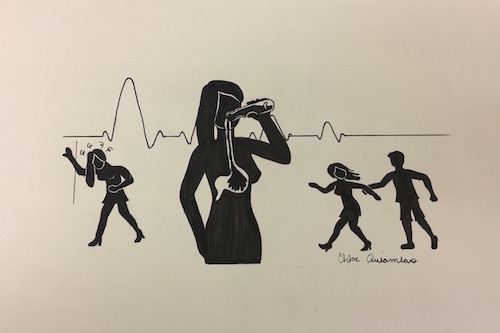
‘Drunkorexia’, students’ newest fad
Choosing to get drunk faster and avoid a few calories is not worth the consequences it can yield.
December 19, 2016
“What does this say about our society when it’s more important to maintain the illusion of health by appearing thin, while drinking to a dangerous excess to remain social?”- Dale Archer, M.D
One would guess that when the Greek words for appetite and desire are used, even as a suffix, it wouldn’t be used in reference to binge drinking.
‘Drunkorexia’ is defined as the act of restricting one’s eating habits before binge drinking.
Though not a medical term, the word ‘drunkorexia’ represents a tangible idea for students to grasp and allows this problem to be discussed.
According to Fusion.net, ‘drunkorexia’ is defined by behaviors that include skipping meals in order to “save” calories on days and nights when drinking is expected. This behavior is most predominantly found in college students, but in the past few years, the number of high school students participating in this alarming trend has substantially increased.
Not only is this behavior unhealthy, it’s also exceedingly dangerous to its participants. Drinking on an empty stomach allows ethanol to reach the blood system at a swifter pace and raises one’s blood alcohol content with an often dangerous speed.
A recent survey completed by students at the University of Missouri-Columbia, found that one in six students said they restricted food in order to consume alcohol within the last year. Of the respondents who said they engaged in ‘drunkorexia’ behaviors, three out of four were women.
This dangerous behavior, mainly found among college women, drinking in excess on an empty stomach, results from the desire to get intoxicated faster while not gaining any weight.
Because women are nearly always the ones participating in the behavior ‘drunkorexia’, the results become even more severe. Women are already more susceptible to the effects of alcohol, and less capable of metabolizing the alcohol in their system.
Adding a restricted diet to excessive drinking creates effects that one’s body cannot physically handle, leading to dangerous situations for women, not only physically but also in their general safety. Women already have to be more diligent than men in these social situations due to the risk of sexual assault.
According to oneinfour.org, one in four college women report surviving rape or attempted rape at some point in their lifetime. In 72-81 percent of cases, in which a male rapes a female college student, the female is reported to be intoxicated.
This is not to advocate for prohibition or banning alcohol from campuses. Alcohol is not the sole reason for sexual assault and it’s completely possible for adult college women to go out and be in a safe and fun social environment.
However, the dangers of sexual assault still exist and not discussing the risks and the situations that they most occur in doesn’t help women stay safe.
The behavior of ‘drunkorexia’, is so dangerous because drinking on an empty stomach allows people to go over their limit, and became far more intoxicated than they might have planned.
Also, when a person drinks on an empty stomach, their body craves some sort of caloric intake, which leads to drinking a larger amount than usual.
The unfortunate reality is that in order for women to stay safe, they must be cautious of their surroundings. ‘Drunkorexia’ is a destructive behavior that can be a catalyst for dangerous situations such as sexual assault to occur.
Choosing to get drunk faster and avoid a few calories is not worth the consequences it can yield. Nothing about the behavior of ‘drunkorexia’ is worth the potential sacrifice of a person’s health and basic human safety.
Actions have consequences, and by making actions less able to occur, we can diminish the consequences. Don’t drink on an empty stomach.